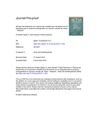 6 citations,
May 2022 in “Frontiers in Microbiology”
6 citations,
May 2022 in “Frontiers in Microbiology” Marine microbes could be used in cosmetics for sun protection, skin care, and possibly preventing hair loss.
 6 citations,
January 2020 in “Skin Pharmacology and Physiology”
6 citations,
January 2020 in “Skin Pharmacology and Physiology” HIF-1α stimulators, like deferiprone, work as well as popular hair loss treatments, minoxidil and caffeine, in promoting hair growth.
 6 citations,
January 2015 in “Journal of regenerative medicine & tissue engineering”
6 citations,
January 2015 in “Journal of regenerative medicine & tissue engineering” The review concludes that innovations in regenerative medicine, tissue engineering, and developmental biology are essential for effective tissue repair and organ transplants.
5 citations,
September 2023 in “Nutrients” Soy protein with isoflavones reduces wrinkles and improves skin hydration in postmenopausal women.
 5 citations,
November 2022 in “Genetics selection evolution”
5 citations,
November 2022 in “Genetics selection evolution” Low-coverage sequencing is a cost-effective way to find genetic factors affecting rabbit wool traits.
 5 citations,
October 2022 in “BMC genomics”
5 citations,
October 2022 in “BMC genomics” Certain microRNAs are important for sheep hair follicle development and could help improve wool quality.
 5 citations,
September 2021 in “Frontiers in Cell and Developmental Biology”
5 citations,
September 2021 in “Frontiers in Cell and Developmental Biology” Dihydrotestosterone treatment on 2D and 3D-cultured skin cells slows down hair growth by affecting certain genes and could be a potential target for hair loss treatment.
5 citations,
January 2019 in “Revista Latino-americana De Enfermagem” Making platelet-rich plasma gel is cheap, safe, and easy when done by trained professionals.
 5 citations,
June 2015 in “Veterinary dermatology”
5 citations,
June 2015 in “Veterinary dermatology” A dog with complete hair loss regrew most hair after treatment, with no relapse after stopping treatment.
 4 citations,
December 2022 in “Frontiers in Endocrinology”
4 citations,
December 2022 in “Frontiers in Endocrinology” Treating non-classic congenital adrenal hyperplasia is complex because the benefits of hormone treatment must be weighed against potential health risks.
 4 citations,
November 2022 in “Frontiers in Medicine”
4 citations,
November 2022 in “Frontiers in Medicine” People with alopecia areata are more likely to have anxiety and depression and a lower quality of life.
 4 citations,
November 2021 in “Pharmaceuticals”
4 citations,
November 2021 in “Pharmaceuticals” Paeonia lactiflora and Poria cocos extracts can potentially increase hair growth and reduce hair loss symptoms by lowering testosterone and inflammation levels.
4 citations,
December 2021 in “Pharmacological Reports” Metformin is less effective in men with early-onset hair loss.
 3 citations,
January 2024 in “Materials advances”
3 citations,
January 2024 in “Materials advances” Cellulose nanocrystals are promising for making effective, sustainable sensors for various uses.
 3 citations,
December 2022 in “npj Regenerative Medicine”
3 citations,
December 2022 in “npj Regenerative Medicine” HSPGs help control stem cell behavior, affecting hair growth and offering a target for hair loss treatments.
3 citations,
August 2021 in “Clinical Case Reports” Genetic testing is crucial before giving azathioprine to avoid severe side effects.
 3 citations,
November 2020 in “Planta medica international open”
3 citations,
November 2020 in “Planta medica international open” Plant-made bFGF helps cells grow and boosts collagen.
 3 citations,
May 2020 in “Actas Dermo-Sifiliográficas”
3 citations,
May 2020 in “Actas Dermo-Sifiliográficas” PRP injections increased hair density in men with hair loss but didn't work for everyone and more research is needed.
 3 citations,
January 2019 in “Jikken doubutsu ihou/Jikken doubutsu/Experimental animals/Jikken Dobutsu”
3 citations,
January 2019 in “Jikken doubutsu ihou/Jikken doubutsu/Experimental animals/Jikken Dobutsu” Pigs without the Hairless gene showed skin and thymus changes, useful for studying human hair disorders.
2 citations,
January 2024 in “Pharmaceuticals” Deep eutectic solvents are eco-friendly and effective for extracting useful pharmaceutical compounds.
 2 citations,
November 2023 in “Acta dermato-venereologica”
2 citations,
November 2023 in “Acta dermato-venereologica” Tofacitinib is effective and safe for treating alopecia areata with a good drug survival rate.
2 citations,
October 2023 in “Science advances” Touching hair can activate nearby nerve cells through signals from the hair's outer layer.
 2 citations,
June 2023 in “Gels”
2 citations,
June 2023 in “Gels” Injectable hydrogels are becoming increasingly useful in medicine for drug delivery and tissue repair.
 2 citations,
May 2022 in “Ethnobotany research and applications”
2 citations,
May 2022 in “Ethnobotany research and applications” Traditional medicinal plants are still widely used and could help local development and inter-ethnic relationships.
 2 citations,
March 2021 in “Carpathian Journal of Food Science and Technology”
2 citations,
March 2021 in “Carpathian Journal of Food Science and Technology” Caraway, Chinese chives, and cassia may improve health and prevent diseases due to their nutrients and medicinal properties.
 2 citations,
March 2019 in “Veterinary dermatology”
2 citations,
March 2019 in “Veterinary dermatology” Thymoma in cats can cause hair loss without inflammation.
 2 citations,
May 2017 in “InTech eBooks”
2 citations,
May 2017 in “InTech eBooks” Stem cells could improve hair growth and new treatments for baldness are being researched.
 2 citations,
January 2016 in “Springer eBooks”
2 citations,
January 2016 in “Springer eBooks” Fat tissue stem cells show promise for repairing different body tissues and are being tested in clinical trials.
 2 citations,
September 2021 in “Journal of Pharmacopuncture”
2 citations,
September 2021 in “Journal of Pharmacopuncture” Korean medicine may help with hair growth in alopecia, but more research is needed to confirm this.
 2 citations,
November 2002 in “Dermatologic Surgery”
2 citations,
November 2002 in “Dermatologic Surgery” The authors' 10-year experience shows that a personalized approach to hair restoration surgery, using various techniques, leads to natural results and high patient satisfaction.
























